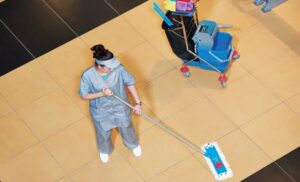
“Initially, Narayana Hrudayalaya had only western commodes. Observing the lack of awareness among visitors to use them, we made a 50-50 combination of Western and Indian commodes. There are also signages to guide the users. Above all, we have advised our staff to instruct users very kindly to use the services appropriately.”
“At Apollo, only experienced members of the staff are let to multi-task while others have specific job descriptions and duties. Simple steps ensure hygiene. For example, garbage is collected in closed bins and transported through a separate chute to the processing area,” explains Deepak.
Adding, Shetty says, “The garbage at Narayana Hrudayalaya is always collected in closed bags and wheeled out in trolleys. When the trolleys come back after disposing the waste, even the wheels are treated with disinfectant.
Further, to discriminate the housekeeping staff and keep them dedicated to their work targets, we have a separate shift team that takes care of the corresponding errands.”
Most of the cleaning in Narayana Hrudayalaya, the second largest cardiac care centre in the world, is done during the night time. “This is mainly to avoid accidents while cleaning due to heavy traffic and disruption of activities.”
More than mechanized cleaning, manual cleaning is resorted to in hospitals, particularly around patient care area or in units where there are many monitoring devices placed. The reasons for engaging manual cleaning include the mind-set of the housekeeper towards adopting professional cleaning practices or tools/machines; the lack of investment by the hospital in mechanized/ professional cleaning and lack of proper space to run cleaning machines inside the hospital.
It has been reported that most of the new recruits are poached for other blue collar jobs. Moreover, given the shunted career growth for housekeeping staff in hospitals, workers tend to migrate and the attrition rate is very high. Hospital to hospital recruitment also kills the time invested in training.
“It is a challenge to retain manpower but we resort to keeping the staff motivated through constant engagements and programs. We firstly make them understand that they are here for a cause. We train them continuously too. We groom their sense of humour and body language. We counsel them when they have problems, visit them when they are sick and maintain a good rapport. We vaccinate them against prone illness too,” says Deepak.
“Our approach lies in giving them space and time to learn the techniques of cleaning. We keep encouraging them, correct their mistakes and polish their skills. This instills a strong sense of belonging. We hire locals so that they do not lose their energy and passion for work which gets lost in the long commuting hours,” explains Shetty. The work culture also has to have a similar value-based approach, he adds.
As part of the smart publicsatisfying strategies adopted by Apollo, a practice of assigning a single person to clean all the general toilets continuously works well as the usage of such toilets are much high during the day.
Shridhar Shetty
Until now only hospitals have been investing time and effort in in-house grooming of their housekeeping staff. Now there are institutes that offer moduled training for hospital housekeeping.
“The certificate holders are taken as General Duty assistants or GDAs. We have absorbed 28 people recently from the institute and are very happy with their work,” says Deepak.
Those trained in hospital housekeeping continue to be a separate lot and the training is ingrained in them, says Shetty. “In fact, the staff who had left the hospital for some other industry have come back to work here again.”
Looking ahead, training seems to be one of the aspects that will help growth of hospitality housekeeping and be a value-addition in the long run.
 CIJConnect Bot-enabled WhatsApp
CIJConnect Bot-enabled WhatsApp










1 comment
This is my first brief visit, and I’m delighted to have everything in one location.